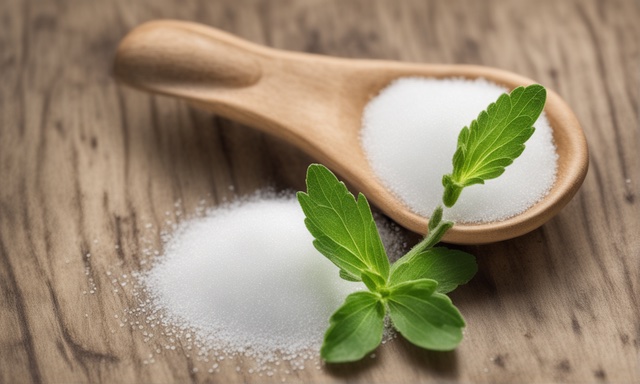Internet Asks: "Is Truvia the Same as Stevia?"
In the bustling market of alternative sweeteners, Truvia and Stevia stand out as popular choices for those seeking sugar substitutes, often leaving consumers questioning their differences. Although related, Truvia and Stevia are not identical products, each possessing unique characteristics and compositions.
sponsored links

What is Stevia?
Stevia refers to a natural sweetener derived from the leaves of the Stevia rebaudiana plant. Steviol glycosides, the compounds responsible for its sweetness, can be up to 300 times sweeter than regular sugar. The stevia available in stores can be in liquid drops, powder, or granulated form.
Sucralose vs stevia is a common comparison in the realm of sweeteners, as sucralose is an artificial sweetener with a sugar-like taste but without the calories. Understanding the differences between these two sweeteners can help individuals make informed choices based on their preferences and health considerations.
Notable Points about Stevia:
- - Natural Origin: Directly extracted from the stevia plant.
- - Zero Calories: Does not add caloric intake to diets.
- - No Sugar: Doesn’t raise blood sugar levels, making it popular among diabetics.
- - Aftertase: Some users notice a slightly bitter or licorice-like aftertaste with Stevia.
What is Truvia?
Truvia is a branded sugar substitute developed by the Cargill company. It is formulated using specific components derived from the stevia plant and other ingredients.
Main Components of Truvia:
- - Erythritol: A sugar alcohol that constitutes the bulk of Truvia. Erythritol is naturally found in certain fruits and fermented foods, and it's known for its low-calorie content.
- - Stevia Leaf Extract: Extracted from the stevia plant, giving Truvia its sweetness.
- - Natural Flavors: Added to enhance the product's taste.
Notable Points about Truvia:
- - Processed: Unlike pure stevia, Truvia undergoes a more extensive refining and production process.
- - Blended Sweetener: It's not purely stevia but a blend of erythritol and stevia leaf extract.
- - Calorie Content: While Truvia is marketed as a zero-calorie sweetener, it's mainly due to the minimal calories present in erythritol, which the body doesn't efficiently absorb.
- - Sweetness Profile: Due to additional ingredients, Truvia is less sweet than pure Stevia, resulting in a flavor profile that many find closer to that of real sugar. The combination of erythritol with Stevia also helps to minimize any aftertaste.
sponsored links
So, Are They the Same?
No, they are not. Here's a summary of their differences:
- 1. Origin: While both are derived from the stevia plant, Truvia is a branded product formulated using erythritol and stevia leaf extract, whereas stevia is a generic term referring to extracts from the stevia plant.
- 2. Composition: Truvia contains a bulk agent (erythritol) and flavorings, in addition to stevia extract. In contrast, pure stevia products contain just steviol glycosides, with no added bulking agents or flavorings.
- 3. Processing: Truvia undergoes more processing compared to most stevia products, particularly those labeled as "raw."
Making an Informed Choice
Understanding the differences between Truvia and Stevia is essential for making informed dietary choices. While Stevia offers a natural and calorie-free sweetness, Truvia provides a blend that may offer a more sugar-like taste and texture, depending on individual preferences.
- - Dietary Preferences: If you seek a pure, natural sweetener with no additives, Stevia may be your preferred choice.
- - Taste Sensitivity: If you are sensitive to the aftertaste of Stevia, Truvia might offer a more palatable alternative.
- - Baking Requirements: Each product behaves slightly differently in recipes, so you may need to experiment to find which one best suits your culinary needs.
Conclusion
While both Truvia and stevia offer a natural alternative to artificial sweeteners and sugar, it's essential to recognize that they aren't the same thing. Consumers should always read labels and product descriptions carefully to understand what they are purchasing and consuming. Whether choosing Truvia, stevia, or any other sweetener, it's always a good practice to consider individual health needs and, when in doubt, consult a nutrition expert.
Disclaimer: The information provided in this article is intended for general knowledge and educational purposes only and should not be construed as medical or dietary advice. Always consult with a healthcare professional or nutritionist about any changes to your diet or health regimen.
sponsored links
References
1. Truvia About Truvia® Sweetness. https://www.truvia.com/why-truvia#:~:text=Three%20Ingredients.&text=Truvia%20Calorie%2Dfree%20Stevia%20Sweetener,and%20extract%20its%20natural%20sweetness
2. UCSF Medical Center Nutrition & Food Services. Sweeteners. https://dtc.ucsf.edu/pdfs/Sweeteners_04.30.10.pdf
3. Diabetes UK. sugar, sweeteners and diabetes. https://www.diabetes.org.uk/guide-to-diabetes/enjoy-food/carbohydrates-and-diabetes/sugar-sweeteners-and-diabetes
4. Truvia Canada. Truvía® Health & Dietary Information. https://www.truvia.ca/health/diabetes
5. WebMD. What Is Erythritol?. https://www.webmd.com/diet/what-is-erythritol
6. Food Standards Australia & New Zealand. Steviol glycosides (960) (intense sweetener) (stevia) . https://www.foodstandards.gov.au/consumer/additives/Pages/Steviol-glycosides-(960)-(intense-sweetener)%20(stevia).aspx
7. Truvia UK. Truvía® Safety Research and Reports. https://www.truvia.co.uk/health/research/dental
8. Mazi TA, Stanhope KL. Erythritol: An In-Depth Discussion of Its Potential to Be a Beneficial Dietary Component. Nutrients. 2023 Jan 1;15(1):204. doi: 10.3390/nu15010204. PMID: 36615861; PMCID: PMC9824470.
9. Harvard T.H. Chan School of Public Health. Low-Calorie Sweeteners. https://www.hsph.harvard.edu/nutritionsource/healthy-drinks/artificial-sweeteners/
10. WebMD. Stevia. https://www.webmd.com/food-recipes/what-is-stevia
11. Britannica. Stevia. https://www.britannica.com/plant/stevia-plant
People are also reading...
Truvia vs Sugar
Is Truvia Safe for Diabetics?
Whole30 What to Expect?
Does Hot Chocolate Have Caffeine?
Are Carrots Acidic?
Are Mangoes Acidic?
Orange Juice pH?
Does Kahlua Have Caffeine?
Calories In a Grilled Cheese?
Is Watermelon Acidic?
6 oz Steak Calories?
Are Strawberries Acidic?
Ready to level-up?
Create meal plans 10x faster, follow up with your clients through our mobile app, and never struggle with meal planning or recipe management again.